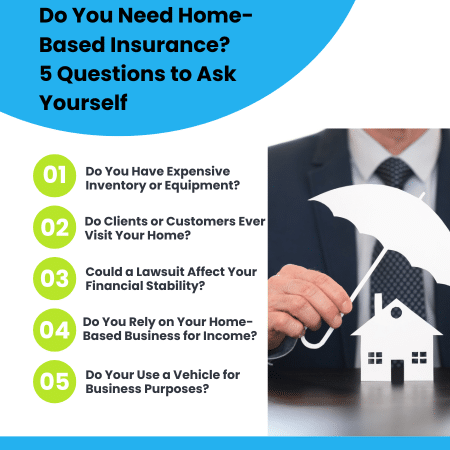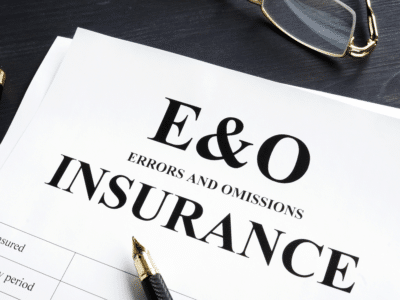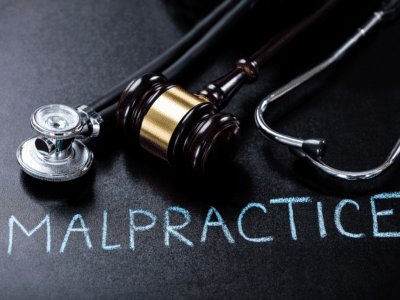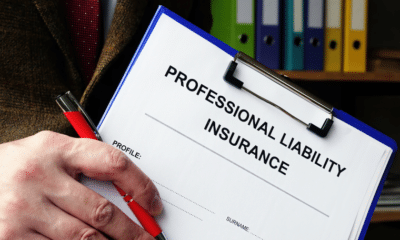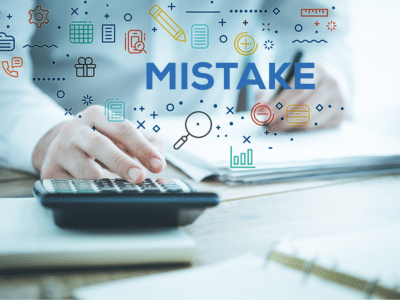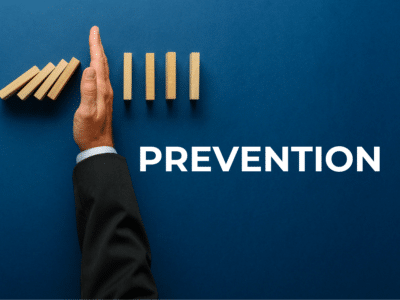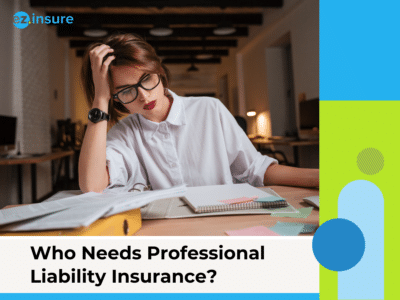Consider this scenario: a client sues your company for inaccurate advice, or someone slips and falls at your workplace. Suddenly, you’re facing thousands of dollars in unanticipated legal fees—all as a result of a simple error or accident.
If you own a small business, protecting yourself from these dangers is critical. But do you know which form of insurance will protect you—general liability or professional liability? The answer could mean the difference between being fully insured and experiencing significant financial loss.
Let’s explore all you need to know.
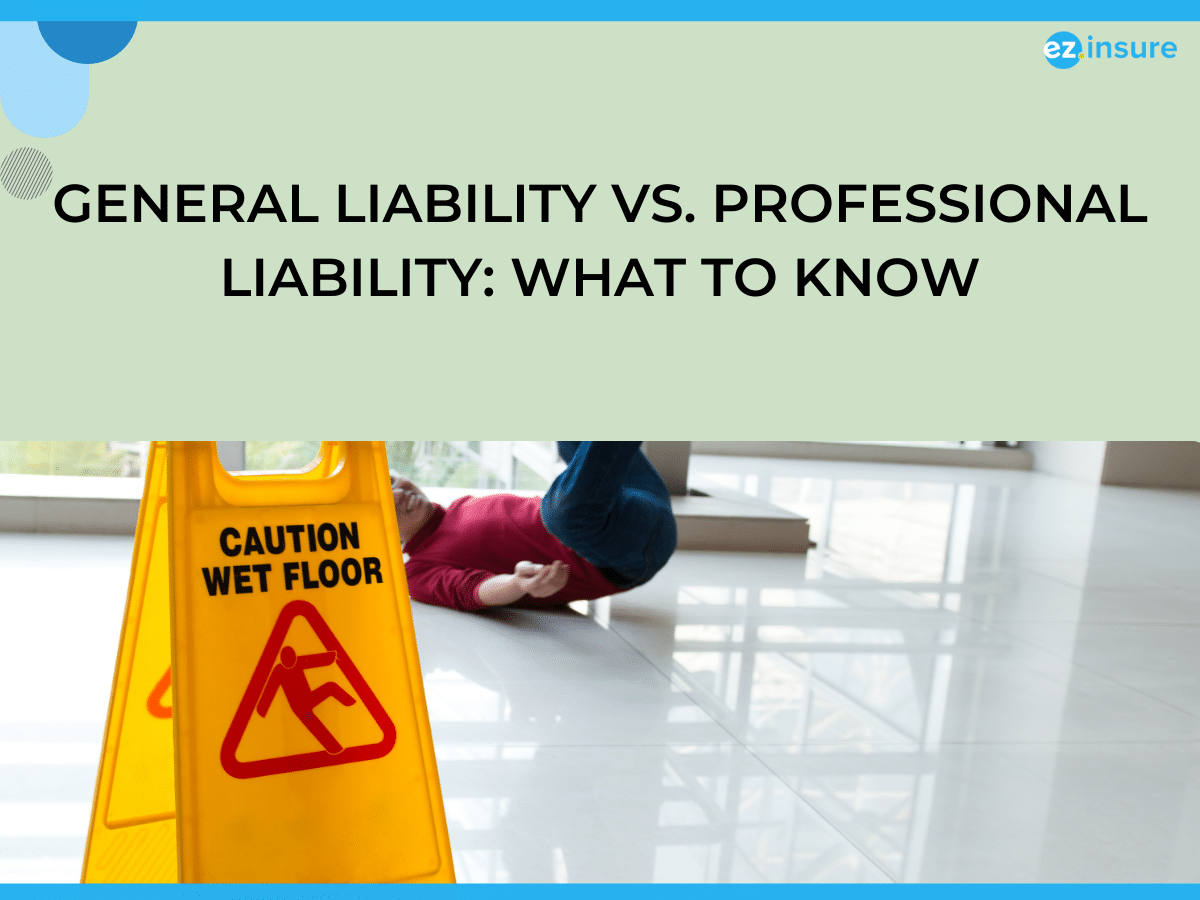
What is General Liability Insurance?
General liability insurance (GLI) is a type of business insurance that protects against third-party claims involving bodily injury, property damage, libel and slander, advertising injury and reputational harm as a result of your business operation. General liability goes a long way in helping cover incidents by paying for legal defense and other court costs.
Key Examples
- A customer slips on a wet floor in your shop and submits a claim for medical expenses.
- You accidentally damage part of a client’s property while working on their site, resulting in costly repairs.
- A competitor alleges you of using advertisements that damaged their brand, resulting in an advertising injury claim.
The Importance of General Liability for Small Businesses
Regardless of the industry that you’re in, general liability can greatly benefit your small business. By protecting your operation against the financial burdens associated with accidents, injuries, property damage, and more, your business will handle the unexpected with ease and remain successful into the future.
Who Needs General Liability Insurance
General liability is essential for the majority of businesses but particularly those with physical location, or if businesses that deal directly with clients face-to-face. Think about businesses that could face claims involving property damage or physical injury, such as restaurants, retail stores, and contractors.
What is Professional Liability Insurance?
Professional liability insurance, also referred to as errors and omissions (E&O) insurance deals with claims resulting from negligence, misrepresentation, or inaccurate advice provided by your professional service. Unlike general liability, which focuses on physical risks (explained in the above section), professional liability is meant to protect service-based businesses where mistakes or advice could lead to financial loss.
Key Examples
- An architect makes a mistake in a building design, resulting in structural concerns and expensive repairs.
- A consultant delivers poor business advice, resulting in financial losses for the customer.
- An accountant makes an error in financial reporting, resulting in tax fines for the customer.
Who Needs Professional Liability Insurance?

Professional liability insurance is essential for service businesses that offer specialist knowledge or guidance. Consultants, accountants, architects, real estate brokers, and healthcare practitioners are more likely to face accusations of carelessness or error. This coverage protects them from financial loss as a result of errors or unmet client expectations.
Do You Need Both Types of Insurance?
Combining Coverages
In some cases, businesses will need both professional and general liability insurance. Luckily most insurance providers offer bundled coverage options where you can get both for a discounted price.
Here are a couple examples of business who benefit from both types of protection:
- Contractors and developers often provide advice in relation to project planning. This presents a need for professional liability insurance. On the other hand, since these professionals perform physical work on people’s properties, a general liability policy is also necessary.
- Someone who’s a graphic designer may want to invest in both types as they probably invite clients into their office from time to time, but also want protection against errors made in their physical work.
Cost of Not Having the Right Coverage
Without the proper insurance policy, your business risks major financial losses. For example, if you only have professional liability, and someone gets injured on your property, you’ll likely still have to cover their medical expenses out-of-pocket.
Or let’s say you have general liability insurance, but no professional coverage, and you make an error when giving consulting advice. Unfortunately with no professional liability, you may have to pay for the costs of a legal settlement stemming from the misinformation.
Factors Influencing the Cost of Liability Insurance
- Business Size and Revenue: Larger organizations typically pay higher premiums due to increased risk and more exposure to large claims.
- Industry: High-risk businesses, such as construction, may incur higher general liability expenses, whereas advice-based industries may have higher professional liability rates.
- Location: Insurance rates vary by state and locality due to changes in laws and overall operational costs. For example, coverage in a big city may be more expensive than in a rural community.
- Coverage Limits: Higher coverage limits provide more protection, but also raise rates. Businesses that require extensive coverage may pay extra, depending on their risk exposure.
- Claims History: A history of previous claims, indicates a higher risk and usually raises rates.
EZ.Insure—A Quick and Affordable Coverage Solution
EZ.Insure is the simple solution for your insurance needs, offering competitive business insurance rates and policies tailored to small businesses. With policies starting for as low as $24.95/month, your business can be equipped with a well-rounded liability insurance package, to ensure you’re fully protected without having to break the bank.
How to Choose the Right Liability Coverage for Your Business
Steps to Consider
- Evaluate Your Business Risks: Take the time to sit down and list out all of the potential risks that your business might face. Be sure to consider both physical incidents and professional errors.
- Consider Industry Requirements: Next, think about the typical insurance requirements in your specific industry. Based on industry norms, you should get a pretty good idea of what coverage(s) are necessary.
- Determine Your Budget: Evaluate how much your business can realistically afford to pay per month in premium costs. Then in turn, consider the level of coverage your business actually requires. While you never want to be under-insured, for a small business, a policy with a hefty coverage limit may not be necessary.
Consult with an EZ.Insure Expert
If you’re still unsure of which coverage type is right for your business, or if you need both, seek the help of an expert insurance agent at EZ.Insure. Working with a licensed agent ensures that no detail is overlooked in regards to your business, so that you’re matched with the most optimal policy type. They’ll also be there to help with every step of the enrollment process, and answer any questions about the selected policies details, so you walk away covered and confident!
Don’t Leave Your Business Exposed—Get Covered Today!
Liability coverage is critical for protecting your organization from unanticipated hazards and costly lawsuits. Whether you require general, professional, or both forms of liability insurance, the appropriate policy will keep your organization safe and secure.
Ready to get started? EZ.Insure is here to help! For a fast, free quote, simply fill out a form on our site, or give us a call at (855)-694-0047 today!
Looking for more information on securing your business? Check out our resource library, that’s home to tons of helpful articles all aimed to help small businesses succeed today and for years to come.

